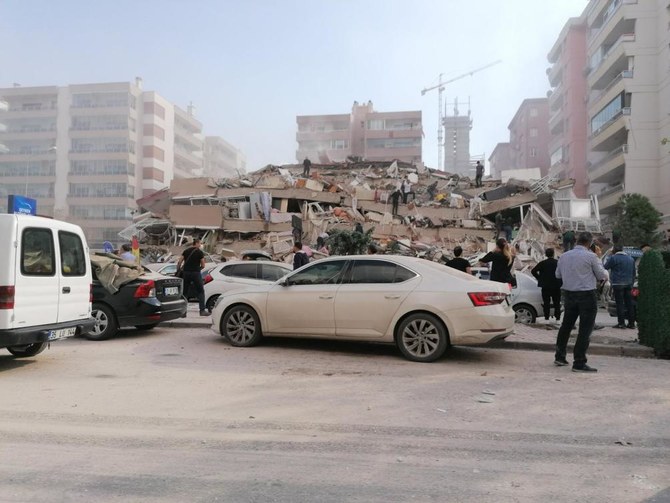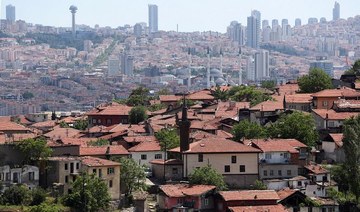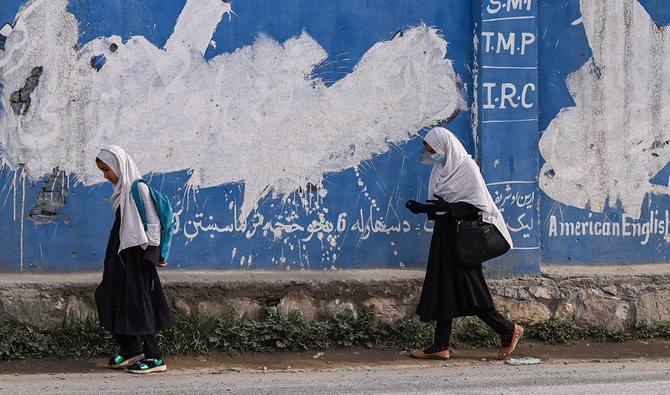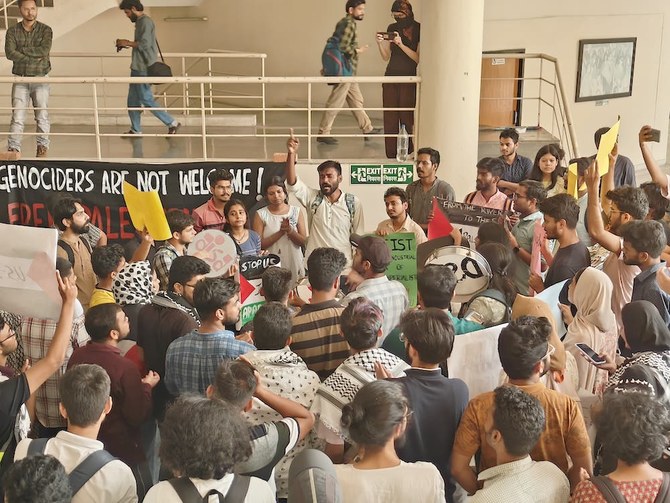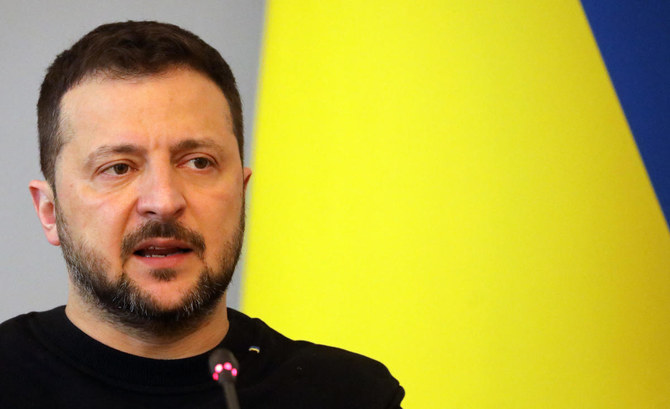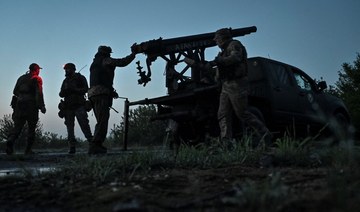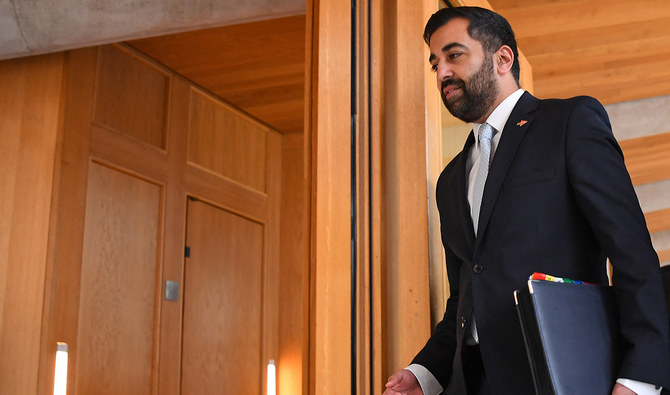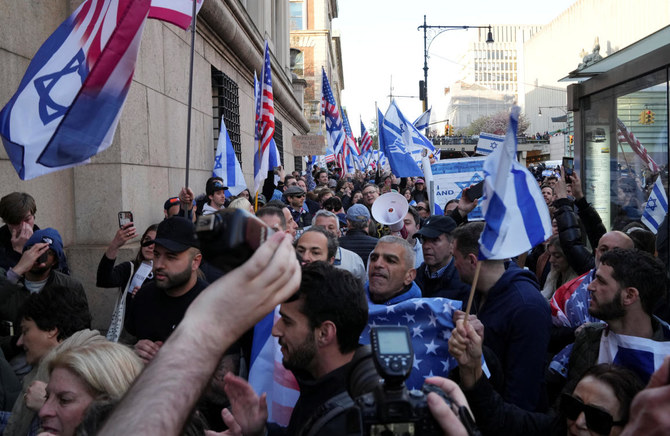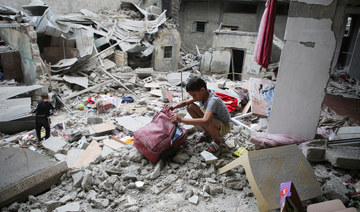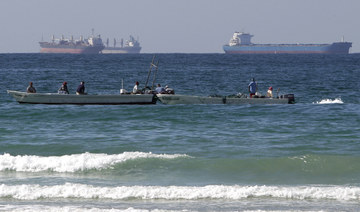ISTANBUL/BAYRAKLI, Turkey: Rescuers dug through heavy blocks of concrete with their bare hands on Friday in a desperate search for survivors after a powerful earthquake levelled buildings across Greece and Turkey, killing at least 22 people.
The late afternoon quake caused a mini-tsunami on the Aegean island of Samos and a sea surge that turned streets into rushing rivers in a town on Turkey’s west coast.
The US Geological Survey said the 7.0 magnitude tremor hit 14 kilometers (nine miles) off the Greek town of Karlovasi on Samos.
Felt in both Istanbul and Athens, it also created a diplomatic opening for the two historic rivals, with Greek Prime Minister Kyriakos Mitsotakis placing a rare call to Turkish President Recep Tayyip Erdogan to offer his condolences and support.
Much of the damage occurred in and around Turkey’s Aegean resort city of Izmir, which has three million residents and is filled with high-rise apartment blocks.
Parts of entire apartments, including toys, pillows and shattered appliances, spilled out on the streets, where survivors huddled in tears, many too shocked to speak.
Aerial footage showed entire city blocks turned to rubble.
Saudi Arabia’s Foreign Ministry expressed its deepest pain for those who perished and were injured in Izmir, praying to God for mercy on the deceased and a speedy recovery for the injured.
Ayse Basarir, a resident of Izmir’s Bostanli neighborhood, told Arab News: “Our building shook for around 10 seconds. We ran out of it quickly, but I don’t think people will have the courage to go back to their houses today. We will rather wait in the parks to see things calming down despite the cold weather and the pandemic threat.”
HIGHLIGHTS
- Saudi Arabia expressed its deepest pain for those who perished and were injured in Izmir.
- The city lies on 17 active fault lines with the potential to trigger massive earthquakes.
- More than 17,000 people were killed in August 1999 when a 7.6 magnitude quake struck Izmir.
- The epicenter was in the Aegean Sea 17 km off the coast of Izmir, at a depth of 16 km.
It is the first time Izmir has witnessed such a massive quake in more than 330 years. The last big
“I thought: Is it going to end? It felt like 10 minutes, like it was never going to end,” said Gokhan Kan, a 32-year-old courier.
“I was terrified not for myself in that moment but for my family, my wife and four-year-old son.”
Izmir’s mayor Tunc Soyer told CNN Turk that 20 buildings had collapsed, with officials focusing their rescue efforts on 17 of them.
Turkey’s disaster relief agency reported 20 deaths and nearly 800 injuries, while in Greece two teenagers died on their way home from school on Samos when a wall collapsed.
The scenes of devastation suggested the toll could rise.
As a precaution, one Izmir hospital rolled some of its patients — still strapped into their beds and hooked up to drips — out on the street.
Turkey’s religious affairs directorate opened its mosques to help shelter some of those left homeless by the disaster.
Images on social media showed water rushing through the streets of one of the towns near Izmir from an apparent sea surge.
Thick white plumes of smoke towered over various parts of the city where large buildings had collapsed.
Rescuers, helped by residents and sniffer dogs, used chainsaws to try and force their way through the rubble of one destroyed seven-floor building.
At another site, Agriculture Minister Bekir Pakdemirli managed to establish mobile phone contact with a girl buried under the debris.
“We ask you to remain calm,” he told her in televised footage. “We will try to lift the concrete block and reach you.”
NTV television said up to six people were trapped at the site, including the girl’s cousin.
The region’s governor said 70 people had been pulled out alive by Friday evening, although how many more were missing remained unknown by sunset.
Rescuers set up tents in a small park away from the buildings for families to spend the night in safety and relative warmth.
On the Greek island of Samos, near the quake’s epicenter, people rushed out into the streets in panic.
“It was chaos,” said deputy mayor Giorgos Dionysiou. “We have never experienced anything like this.”
The Greek civil protection agency told Samos residents in a text message to “stay out in the open and away from buildings.”
Greece and Turkey are situated in one of the world’s most active earthquake zones.
The two neighbors also suffer from historically poor relations despite both being members of the NATO military alliance.
But the quake saw a spurt of what pundits immediately termed “earthquake diplomacy,” with calls exchanged by their foreign ministers and then, hours later, Mitsotakis and Erdogan.
“Whatever our differences, these are times when our people need to stand together,” the Greek prime minister said on Twitter.
“Thank you, Mr. Prime Minister,” Erdogan tweeted in reply. “That two neighbors show solidarity in difficult times is more valuable than many things in life.”
The US State Department said Washington was “heartened” by the newfound cooperation.
France, whose President Emmanuel Macron has sparred repeatedly with Erdogan in the past year, said it stood in “full solidarity” with the two countries.
Some of the world’s strongest earthquakes have been registered along a fault line that runs across Turkey to Greece.
In 1999, a 7.4 magnitude earthquake struck Turkey’s northwest, killing more than 17,000 people, including 1,000 in Istanbul.
In Greece, the last deadly quake killed two people on the island of Kos, near Samos, in July 2017.



